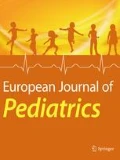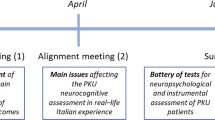Abstract
Early dietary treatment of phenylketonuria (PKU) prevents intellectual retardation and gross neurological impairment although not all neuropsychological problems. This study investigates to what extent the illness and its treatment imposes a burden on emotional development of early-treated PKU patients and on rearing practices of their parents. It is concluded that in early-treated PKU it is particularly difficult to find constructive ways to adapt to the situation for children as well as for parents. As coping with PKU and its treatment is so complicated, paediatric control should be combined with psychocounselling.
Similar content being viewed by others
Abbreviations
- CBCL-p :
-
child behaviour check list, parents form
- DM :
-
diabetes mellitus
- DQC :
-
depression questionnaire for children
- EvIl :
-
evaluation of illness
- HYP −p :
-
hyperactivity score on CBCL-p
- IMP :
-
impulsivity score on MFFT
- IN :
-
inadequacy score on DPQ-C (selfesteem)
- PKU :
-
phenylketonuria
- Restr :
-
restrictiveness score on CRPR
- SI :
-
social inadequacy score on DPQ-C
References
Achenbach TM, Edelbrock C (1983) Manual for the child behavior check list and revised behavior profile. University of Vermont, Burlington
Awiszus D, Unger I (1990) Coping with PKU: results of narrative interviews with parents. Eur J Pediatr 149 [Suppl 1]:45–51
Block JH, Block J (1980) The role of ego-control and ego-resilience in the organization of behavior. In: WA Collins (Ed) The Minnesota Symposia on Child Psychology 13: 39–101
Dekovic M (1989) Measuring dimensions and patterns of childrearing: dutch version of the block child rearing practices report (CRPR). Catholic University Nijmegen
Fishler K, Azen CG, Henderson R, Friedman EG, Koch R (1987) Psychoedu- cational findings among children treated for phenylketonuria. Am J Ment Defic 92: 65–73
Huisman J, Schot LWA van der, Hendrixk, MMT, Kalverboer AF, Slijper FME (1992) The interlectual development of patients with phenylketonuria; 15 years screening in the Netherlands (in Dutch). Ned Tijdschr Geneeskd 136, 46: 2277–2281
Kagan J, Rosman BL, Day D, Albert J, Philips W (1964) Information processing in the child: Significance of analytic and reflective attitudes. Psychol Monogr; 78
Koch R, Azen C, Friedman EG, Williamson ML (1984) Paired comparisons between early-treated PKU children and their matched sibling controls on intelligence and school achievement test results at eight years of age. J Inherited Metab Dis 7: 86–90
Koff E, Boyle P, Sigfried M, Pueschel SM (1977) Perceptual-motor functioning in children with phenylketonuria. Am J Dis Child 131: 1084–1087
Luteijn F, Dijk H van, Ploeg FAE van der (1989) of the Dutch personality questionnaire for children (in Dutch). Swets and Zeitlinger, Lisse, the Netherlands
Primrose DA (1983) Phenylketonuria with normal intelligence. J Ment Defic Res 27: 239–246
Realmuto GM, Garfinkel BD, Tuchman M, Tsai MY, Chang PN, Fisch RO, Shapiro S (1986) Psychiatric diagnosis and behavioral characteristics of phenylketonuric children. J Nerv Ment Dis 174(9): 536–540
Shulman S, Fisch RO, Zempel CE, Gadish O, Chang PN (1991) Children with phenylketonuria: the interface of family and child functioning. Dev Behav Pediatr 12(5): 315–321
Smith I, Beasley MG, Wolff OH, Ades AE (1988) Behavior disturbance in 8 year old children with early treated phenylketonuria. J Pediatr 112(3): 403–408
Sonneville LMJ de, Schmidt E, Michel U, Batzler U (1990) Preliminary neuropsychological test results. Eur J Pediatr 149: S39–44
Stevenson JE, Hawcroft J, Lobascher M, Smith I, Wolff O, Graham PJ (1979) Behavioral deviance in children with early treated phenylketonu-ria. Arch Dis Child 54: 14–18
Taylor EA (1986) The overactive child. Clinics in developmental medicine 97. Blackwell, Oxford
Verhulst FC, Akkerhuis GW, Althaus M (1985) Mental health in Dutch children: (I) a cross-cultural comparison. Acta Psychiatr Scand 72 [Suppl 323]
Waisbren SE, Mahon BE, Schnell RR, Levy HL (1987) Predictors of intelligence quotient and intelligence quotient change in persons treated for phenylketonuria early in life. Pediatrics 79(3): 351–355
Welsh MC, Pennington BF, Ozonoff S, Rouse B, McCabe ERB (1990) Neuropsychology of early-treated phenylketonuria: specific executive function deficits. Child Dev 61: 1697–1713
Wit CAM de (1987) Depression questionnaire for children (in Dutch) (DVK). Acco, Amersfoort
Author information
Authors and Affiliations
Rights and permissions
About this article
Cite this article
Hendrikx, M.M.T., van der Schot, L.W.A., Slijper, F.M.E. et al. Phenylketonuria and some aspects of emotional development. Eur J Pediatr 153, 832–835 (1994). https://doi.org/10.1007/BF01972893
Received:
Accepted:
Issue Date:
DOI: https://doi.org/10.1007/BF01972893




